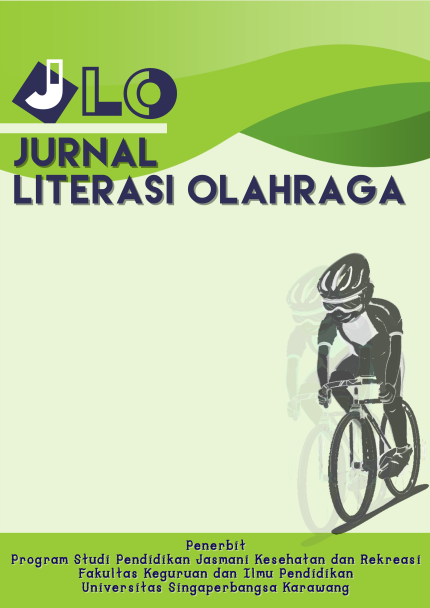Legitimasi Esports dalam Kecabangan Olahraga: Studi Literature Review
DOI:
https://doi.org/10.35706/jlo.v2i2.5357Abstrak
Perdebatan tentang esports masuk dalam kategori olahraga masih berlangsung meskipun terdapat penelitian-penelitian yang sudah menyatakan bahwa esports adalah olahraga. Hal ini menjadi dasar artikel ini ditulis dengan metode literature review. Metode ini diambil karena masih terdapat anggapan bahwa esports merupakan aktivitas bermain game yang hanya bertujuan untuk mencari keuntungan. Artikel-artikel yang ada dijadikan sebagai landasan bahwa pengartian esports tidak hanya sebatas bermain game dan mencari keuntungan. Selain itu persepsi esports juga hanya sebatas bermain video game, padahal esensi dari esports lebih dari itu. Tidak dipungkiri bahwa esports memang erat hubungannya dengan ekonomi, namun melalui artikel ini pengkajian dari esports tidak hanya dipandang satu sisi saja, melainkan karakteristik lainnya yang dapat menjadikan esports diterima sebagai olahraga. Kesimpulan dari artikel ini adalah esports dapat dikategorikan dalam olahraga dengan diterapkan nilai-nilai dan karakteristik olahraga. Seperti kompetitif, memiliki aturan, dilakukan dengan aktivitas fisik, pelatihan yang sesuai program dari pelatih, memperhatikan gizi pemain, serta keprofesionalan pemain dalam melaksanakan permainan.
Unduhan
Referensi
Abraham, H. (2019). 5 Fakta Bahwa E-Sport Memang Tergolong Olahraga. Idntimes.Com.
Baltezarević, R., & Baltezarević, B. (2018). THE IMPACT OF VIDEO GAMES ON THE eSPORTS FORMATION. Facta Universitatis, Series: Physical Education and Sport, 16(1), 137. https://doi.org/10.22190/fupes170614012b
Bányai, F., Griffiths, M. D., Király, O., & Demetrovics, Z. (2019). The Psychology of Esports: A Systematic Literature Review. Journal of Gambling Studies, 35(2), 351–365. https://doi.org/10.1007/s10899-018-9763-1
Barus, L. (2018). 4 Alasan Mengapa Esports Adalah Olahraga. Esportnesia.
Bessy Sitorus, P. (2015). Peranan olahraga dalam meningkatkan kesehatan. Jurnal Pengabdian Kepada Masyarakat, 21, 65–72.
Breuer, C., Wicker, P., & Von Hanau, T. (2012). Consequences of the decrease in volunteers among German sports clubs: is there a substitute for voluntary work? International Journal of Sport Policy and Politics, Vol. 4, No. 2, Pp.173–186., 4(2), 173–186.
Committee of Ministers. (2001). ON THE REVISED EUROPEAN SPORTS CHARTER. Council of Europe.
Craddock, D. (2016). DOTA 2 International is offering more than $20 million in prize money. Shack News.
Deutscher Olympischer Sportbund. (2014). Aufnahmeordnung des DOSB. Deutscher Olympischer Sportbund.
Difrancisco-Donoghue, J., Balentine, J., Schmidt, G., & Zwibel, H. (2019). Managing the health of the eSport athlete: An integrated health management model. BMJ Open Sport and Exercise Medicine, 5. https://doi.org/10.1136/bmjsem-2018-000467
Edgar, A. (2019). Esport. Sport, Ethics and Philosophy, 13(1), 1–2. https://doi.org/10.1080/17511321.2019.1558558
ESL. (2016). ESL One Cologne kehrt als das CS:GO-Highlight des Jahres 2017 zurick. ESL.
Graham, B. A. (2017). eSports to be a medal event at 2022 Asian Games. Sport The Guardian.
Hallmann, K., & Giel, T. (2018). eSports – Competitive sports or recreational activity? Sport Management Review, 21(1), 14–20. https://doi.org/10.1016/j.smr.2017.07.011
Hilvoorde, I. van, & Pot, N. (2016). Embodiment and fundamental motor skills in eSports. Sport, Ethics and Philosophy, 10(1), 14–27. https://doi.org/10.1080/17511321.2016.1159246
Huk, T. (2019). The social context of the benefits achieved in eSport. New Educational Review. https://doi.org/10.15804/tner.2019.55.1.13
Jenny, S. E., Manning, R. D., Keiper, M. C., & Olrich, T. W. (2017). Virtual (ly) Athletes: Where eSports Fit Within the Definition of “ Sport .” Quest, 69(1), 1–18. https://doi.org/https://doi.org/10.1080/00336297.2016.1144517
Keefer, J. (2017). DOTA 2 International 2017 Prize Pool Sets Esports Record. Shack News.
Kurniawan, F. (2020). E-Sport Dalam Fenomena Olahraga Kekinian. Jorpres (Jurnal Olahraga Prestasi), 15(2), 61–66. https://doi.org/10.21831/jorpres.v15i2.29509
Lokhman, N., Karashchuk, O., & Kornilova, O. (2018). Analysis of eSports as a commercial activity. Problems and Perspectives in Management, 16(1), 207–213. https://doi.org/10.21511/ppm.16(1).2018.20
Merwin, C., Masura, S., Piyush, M., Toschiya, H., Terry, H., & Alexander, D. (2018). The World of Games: eSports: From Wild West to Mainstream. Equity Research, October, 37.
Miles. (2017). EU court says bridge is a sport, should be tax-exempt in Britian. The Economic Times.
Sigit Purworaharjo, G. F. (2018). Tinjauan Literatur Secara Sistematis Pada Self-Service Business Intelligence. Konferensi Nasional Sistem Informasi (KNSI), 986–990. http://jurnal.atmaluhur.ac.id/index.php/knsi2018/article/view/482/407
Sjöblom, M., & Hamari, J. (2017). Why do people watch others play video games? An empirical study on the motivations of Twitch users. Computers in Human Behavior, 75, 985–996. https://doi.org/10.1016/j.chb.2016.10.019
Southern, N. (2017). The rise of eSports : A new audience model and a new medium? (Issue July).
Sumartiningsih, S. (2011). Variasi Tipologi dan Prestasi Atlet (Ditinjau dari Atlet Jawa Timur pada PON XVII). Media Ilmu Keolahragaan Indonesia, 1(1). https://doi.org/10.15294/miki.v1i1.1134
Warren, J. M., Ekelund, U., Besson, H., Mezzani, A., Geladas, N., & Vanhees, L. (2010). Assessment of physical activity - A review of methodologies with reference to epidemiological research: A report of the exercise physiology section of the European Association of Cardiovascular Prevention and Rehabilitation. European Journal of Cardiovascular Prevention and Rehabilitation, 17(2), 127–139. https://doi.org/10.1097/HJR.0b013e32832ed875
Witkowski, E. (2012). On the digital playing field: How we “do sport” with networked computer games. Games and Culture, 7(5), 349–374. https://doi.org/10.1177/1555412012454222
World Health Organization. (2017). Physical activity. World Health Organization.
File Tambahan
Diterbitkan
Cara Mengutip
Terbitan
Bagian
Citation Check
Lisensi
Hak Cipta (c) 2021 Jurnal Literasi Olahraga

Artikel ini berlisensi Creative Commons Attribution-NonCommercial 4.0 International License.





